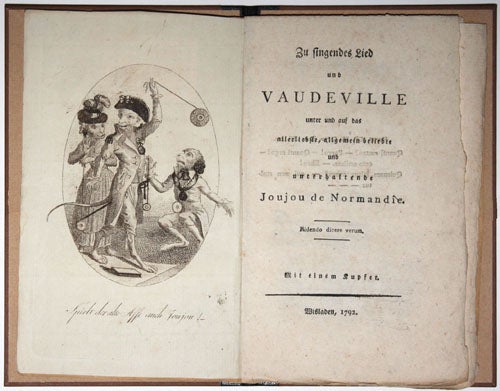
Zu singendes Lied und Vaudeville unter und auf das allerliebste, allgemein beliebte und unterhaltende Joujou de Normandie.
8vo [17 x 11 cm], 8vo [17 x 11 cm], (1) f. engraved plate, (8) ff. (last blank). Bound in old wrappers and housed in modern case. Ex libris of Paul Wallich. Minor toning and a few spots, but a genuine copy, showing original deckle edges. Extremely rare sole edition of two German vaudeville songs satirizing the society-wide obsession with the yoyo, a toy which was popularized during the French Revolution, and subsequently became as ubiquitous across Europe as the Rubik’s cube in more recent times. Although images of it appear on ancient Greek vases, Western Europe was introduced to the yoyo in the late eighteenth century, when the toy became popular with the aristocracy. French aristocrats, fleeing from the revolutionaries, introduced it to other parts of Europe, giving rise to the names “émigrette,” “joujou de Coblenz” and “joujou de Normandie.” It was particularly prized as a stress-buster, as in Beaumarchais’ Noces de Figaro (1789), where Figaro expresses his nervousness in one scene by playing with his émigrette. When asked about its use, he replies: “It is a noble toy, which dispels the fatigue of thinking.” The present work – two strophic vaudeville songs to be sung to familiar tunes – attests to the arrival of the fashion in Germany, satirizing the obsession with the toy which had gripped all layers of society. The engraving shows two male and one female monkey, dressed in revolutionary French fashion, playing with yoyos. A book lies, discarded, at the feet of the most elegantly dressed monkey. The first song, to be sung to the popular Marlborough tune, is an ode to the joujou, and defends it against charges of stultifying the player with tongue-in-cheek references to Ovid and Virgil, and purports to underline its meditative qualities. The second song gives a humorous overview of the many social and emotional situations in which a yoyo offers solace: the young lover waiting anxiously for his mistress, the lawyer who has just lost a case, the doctor who cannot save a patient, the debutante bored with her romantic novel, the pastor bent over a tedious sermon – all grab their yoyos and forget their concerns. Printed in 1792, with the probably fictitious “Wisladen” imprint, this work appeared at the very height of the craze in Germany. In Albert Oppermann’s historical novel One Hundred Years 1770-1870 (1870), an entire chapter is entitled “Joujou de Normandie.” In it, the author quotes a critic from a 1792 Berlin fashion magazine complaining that “Everything is forgotten and neglected because of the joujou; one wears clothes of old-fashioned color and cut, cravats from the previous year; and the ladies throw on their hat without care or taste, all the faster to grab their joujou again.” OCLC identifies only the Staatsbibliothek zu Berlin copy. *SBB record.
* SBB record.
Sold
